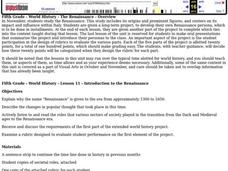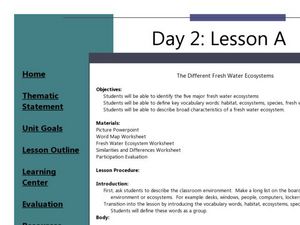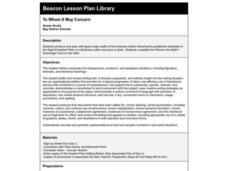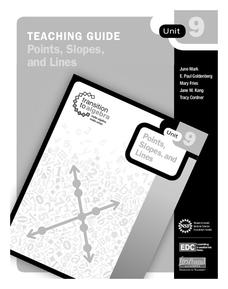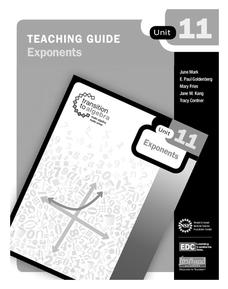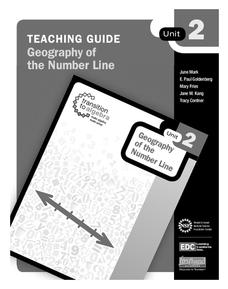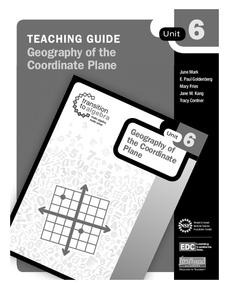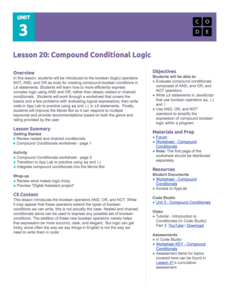Curated OER
Using Polynomials To Find Perimeter
Fifth graders engage in the solving of a real life application problem using the concept of calculating perimeter. They apply the operations of calculating with the polynomials for finding the perimeter of triangles,quadrilaterals, and...
Curated OER
Linear Equations
Ninth graders solve linear equations. For this Algebra I lesson, 9th graders investigate the properties of equations (Reflexive, Symmetric, Transitive, Substitution, and Transformation Properties) and use these properties to solve...
Curated OER
The Renaissance
Fifth graders examine the rise of the Renaissance and the contributions and roles of various groups such as ancient Greeks, Muslim scholars, the aristocracy, the Catholic Church, and tradesmen. They develop and write a report on a...
Curated OER
The Landscape Through Geographer's Eyes
Learners examine different types of landscapes through a geographer's eye. Using a city block or a suburb, they organize their thoughts and take notes to survey a site. They discuss what they have seen and write about how looking at...
Curated OER
The Different Fresh Water Ecosystems
Students summarize the characteristics of an ecosystem. In this biology instructional activity, students identify five major fresh water ecosystem. They define terms and write a journal about what they learned.
Curated OER
Striking Up a Conversation
Young scholars, in groups, examine, discuss, and present the positions of the various parties involved in the New York City Metropolitan Transportation Authority public transportation strike, including the Transport Workers Union, the...
Curated OER
To Whom It May Concern
Fourth graders produce and peer edit typed rough drafts of the business letters following the guidelines illustrated in the Eight Essential Parts of a business letter and save to disks. They complete the Where's the Math? scavenger hunt...
Curated OER
Underground Railroad/Quilts
Students explore the Underground Railroad communication system. In this cross curriculum fine arts and United States history Civil War lesson, students view several websites that feature quilts constructed by slaves during the...
Curated OER
Summer Reading to Encourage Professional Development
A compilation of titles to engage, motivate, and inspire educators for another year of teaching and learning.
Curated OER
Helping Homeschoolers Be College-Ready
Advice on essential skills for college from a homeschooled, public school teacher.
Curated OER
Practice Makes Perfect: Citing Textual Evidence
Strategies, lesson plans, and ideas to help pupils locate and cite textual evidence.
Curated OER
Protest Music Video
Students use iMovie to express the meaning and context of a protest song from the '60s or '70s. They explore different views of the protest movement and gain an understanding of the emotional and political overtones of the times.
National Endowment for the Humanities
A “New English” in Chinua Achebe’s “Things Fall Apart”: A Common Core Exemplar
To examine the “New English” Chinua Achebe uses in Things Fall Apart, readers complete a series of worksheets that ask them to examine similes, proverbs, and African folktales contained in the novel. Individuals explain the meaning...
Curated OER
Everyone Can Benefit from Professional Development
These resources will point you in the direction of valuable professional development opportunities.
Education Development Center
Points, Slopes, and Lines
Before graphing and finding distances, learners investigate the coordinate plane and look at patterns related to plotted points. Points are plotted and the goal is to look at the horizontal and vertical distances between coordinates and...
Geography 360°
Exponents
Don't let the rules overrule the lesson. Mental math steps in and helps learners understand exponent patterns. The material focuses on the introductory problems of exponents, such as simplifying expressions. Teacher guides are...
Education Development Center
Thinking Things Through Thoroughly
Problem solving is a skill of its own. Learners use a variety of problems to encourage mental math and logic to get the correct answer. Guiding questions are provided along the way to encourage the right way of thinking to help tackle...
Education Development Center
Geography of the Number Line
It's more than just numbers on a line, its an organizational, mental math machine to help learners understand the value of numbers. The tool is handy when introducing positive and negative integers to see their values and relationships....
Education Development Center
Micro-Geography of the Number Line
Young mathematicians dive into the number line to discover decimals and how the numbers infinitely get smaller in between. They click the zoom button a few times and learn that the number line doesn't just stop at integers. Includes a...
Education Development Center
Geography of the Coordinate Plane
Put the graph into graphing and allow learners to understand the concept of point plotting and how it relates to data. The worksheet provides a nice way to connect data analysis to a graph and make predictions. The worksheets within the...
Curated OER
Around the World in 10 Days
Students engage in producing responses to "what" questions and their written responses will be recorded in a Travel Journal. They produce their respones using a word processor. This activity is very detailed and a rubic is included.
Code.org
Compound Conditional Logic
Scholars explore compound conditional logic and learn to use the Boolean operators AND, OR, and NOT within conditional statements by incorporating these operators to improve a previously created app.
Curated OER
Propaganda
How does word choice affect the reading of a text? Compare two headlines that were written about the same event. Is one biased? Discuss how word choice often reveals the author's feelings about a topic. Then look at different techniques...
Curated OER
Intro to Pronouns
Sixth graders are able to identify personal pronouns and understand their function. They are able to use personal pronouns correctly as subjects and objects in sentences. Then they look at sentences given by the teacher, and they list...




